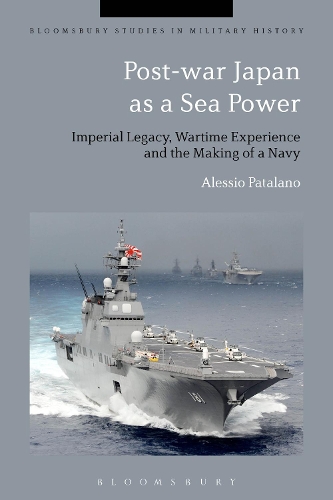
Post-war Japan as a Sea Power: Imperial Legacy, Wartime Experience and the Making of a Navy
(Hardback)
Available Formats
Publishing Details
Post-war Japan as a Sea Power: Imperial Legacy, Wartime Experience and the Making of a Navy
By (Author) Alessio Patalano
Bloomsbury Publishing PLC
Bloomsbury Academic
23rd April 2015
United Kingdom
Classifications
Professional and Scholarly
Non Fiction
Asian history
Naval forces and warfare
359.0095209045
Physical Properties
Hardback
272
Width 156mm, Height 234mm
549g
Description
In Post-war Japan as a Sea Power, Alessio Patalano incorporates new, exclusive source material to develop an innovative approach to the study of post-war Japan as a military power. This archival-based history of Asia's most advanced navy, the Japanese Maritime Self-Defence Force (JMSDF), looks beyond the traditional perspective of viewing the modern Japanese military in light of the country's alliance with the US. The book places the institution in a historical context, analysing its imperial legacy and the role of Japan's shattering defeat in WWII in the post-war emergence of Japan as East Asias sea power.
Reviews
Japanese Prime Minister Shinzo Abe currently confronts a threat China poses in the South China Sea. Abes ongoing task is to revise the postwar role of the Japanese military from a self-defense force to a traditional military establishment, especially the navy. Early in the 20th century, the Imperial Japanese Navy was one of the most formidable naval forces in the world, but few present-day readers are aware of the JMSDF, or Japanese Maritime Self-Defense Force. Patalano (Kings College London) seeks to enlighten the public about the Japanese effort to create a new naval force relying on civilian control but capitalizing on JMSDFs imperial past. The author reveals how the military in Japan reinvented itself to meet the new realities of the postwar world. Although, as Patalano notes, elements in Japan kept those memories alive, it took a new breed of naval officers to integrate those traditions into the JMSDF. Patalanos excellent study will not disappoint those interested in contemporary Japanese naval history. Summing Up: Highly recommended. Most levels/libraries. -- C. C. Lovett, Emporia State University, USA * CHOICE *
Its focus on a navys ethos is methodologically innovative and might well inform future studies of other navies. Its emphasis on the continuities between imperial, postwar, and contemporary Japan will enlighten historians of East Asia as well as those seeking to understand current international tensions in that region. Superb piece of scholarship. -- Roger Dingman, University of Southern California, USA * Journal of Military History *
This book is truly remarkable and fills a great void. For a long time writing about any defense issue in postwar Japan was a taboo owing to the [often misunderstood] so-called no war postwar constitution of Japan. And even when that taboo receded, as it has although not completely, Japanese authors especially shied away from any linkage between the Imperial Army and Navy and the postwar Self-Defense Forces. Patalanos in-depth coverage of the influential writings of Messrs. Itou and the two Agawas is absolutely masterful. In a nutshell, he has written a most impressive contribution which advances previous scholarship on the linkage between the Imperial Japanese Navy and the Japan Maritime Self-Defense Force. * James E. Auer, Director of the Auer U.S.Japan Center and Professor Emeritus of Vanderbilt University, USA *
In his wide-ranging account of Japan's Maritime Self-Defence Force since 1952, Dr Patalano shows its attempt to balance its heritage from the Imperial Navy with the ever-changing security needs of the Pacific in postwar decades. He covers the phases of its rearmament, modernization and dependence on (and later cooperation with) the US Navy and focuses on the contribution of Japan's large naval force to regional and international security in the post-Cold War years. Based on innovative research, this analysis is a highly relevant guide to the contemporary problems of the East Asian region. * Ian Nish, Professor Emeritus of International History, the London School of Economics, UK *
Patalano synthesizes a sweeping array of previously unavailable Japanese archival resources, a broad reading of Japanese secondary sources, and numerous interviews of Japanese officers to provide by far the best available history of the Japanese Maritime Self-Defense Force. Today the Imperial Japanese Navy forms both the source of the fighting spirit and the professional model for the post-war navy, which unlike its predecessor is the senior, not junior military service. In other words, Japan has made the transition from continental to maritime power. * S. C. M. Paine, William S. Sims Professor of History and Grand Strategy, U.S. Naval War College *
Alessio Patalano is one of the worlds leading experts on the Japanese navy. In this sophisticated book, he departs from the usual battle history format and shows the extent of the debt that todays Japanese Maritime Self Defence Force owes, both consciously and unconsciously to the notions and traditions of the old Imperial Japanese Navy. Given the tense situation in Northeast Asia at the moment, Japans difficult relationship with a rising China and the acute political sensitivity in the region about Japans role in the Second World War, few maritime matters could be so significant. They deserve the calm, dispassionate and authoritative review that Patalano provides. * Geoff Till, Chairman of the Corbett Centre, Defence Studies Department, Kings College London, UK *
Sophisticated, well sourced Post-war Japan As a Sea Power is a consequential and timely contribution to our understanding of postwar Japan's military and naval thought and traditions. -- Rotem Kowner, The University of Haifa, Israel * Michigan War Studies Review *
Author Bio
Alessio Patalano is Lecturer in East Asian Warfare and Security at the Department of War Studies, King's College London, UK.
